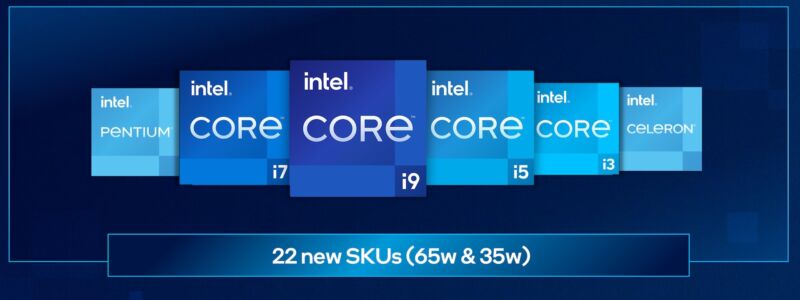
Enlarge / Intel is giving its desktop processors their first top-to-bottom overhaul in years. (credit: Intel)
Intel released its first 12th-generation Core desktop processors a little over two months ago, and we were pretty impressed with the results; the chips still consume a lot of power, but they generally come with the performance to back it up. Today, Intel is announcing the rest of the lineup, including non-overclockable versions of its Core i9, i7, and i5 processors; new Core i3, Pentium, and Celeron chips that bring the Alder Lake architecture to lower-end PCs; and low-power versions of the processors suitable for mini PCs and other systems where space and cooling capacity are at a premium.
New processors, from Core i9 to Celeron
Intel is announcing a total of 22 new CPUs today, and they replace most of the company's currently available 11th- and 10th-generation desktop CPUs. Like the overclockable K- and KF-series processors that are already available, these chips will require a new motherboard with an LGA 1700 socket and can support either DDR4 or DDR5, depending on the motherboard you buy (more on those in a bit).
All of these processors are built on the "Intel 7" process, formerly known as "10nm Enhanced Super Fin." Intel justifies the name change by saying that the Intel 7 transistor density is similar to 7 nm-branded manufacturing processes from competitors like TSMC and Samsung. The 12th-generation Core lineup is the first time in about six and a half years that Intel has moved beyond some version of its 14 nm process for desktop processors.
Read 14 remaining paragraphs | Comments

Enlarge / Intel is giving its desktop processors their first top-to-bottom overhaul in years. (credit: Intel)
Intel released its first 12th-generation Core desktop processors a little over two months ago, and we were pretty impressed with the results; the chips still consume a lot of power, but they generally come with the performance to back it up. Today, Intel is announcing the rest of the lineup, including non-overclockable versions of its Core i9, i7, and i5 processors; new Core i3, Pentium, and Celeron chips that bring the Alder Lake architecture to lower-end PCs; and low-power versions of the processors suitable for mini PCs and other systems where space and cooling capacity are at a premium.
New processors, from Core i9 to Celeron
Intel is announcing a total of 22 new CPUs today, and they replace most of the company's currently available 11th- and 10th-generation desktop CPUs. Like the overclockable K- and KF-series processors that are already available, these chips will require a new motherboard with an LGA 1700 socket and can support either DDR4 or DDR5, depending on the motherboard you buy (more on those in a bit).
All of these processors are built on the "Intel 7" process, formerly known as "10nm Enhanced Super Fin." Intel justifies the name change by saying that the Intel 7 transistor density is similar to 7 nm-branded manufacturing processes from competitors like TSMC and Samsung. The 12th-generation Core lineup is the first time in about six and a half years that Intel has moved beyond some version of its 14 nm process for desktop processors.
Read 14 remaining paragraphs | Comments
January 04, 2022 at 11:40PM

Post a Comment